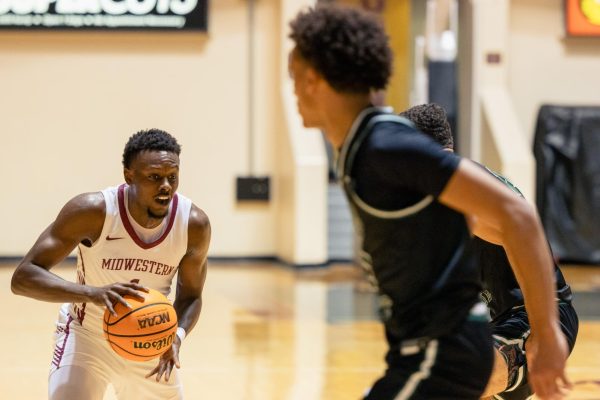Humanities welcomes diversity with African American Art and Literature course
Tyler M. Williams , humanities assistant professor, is teaching an African-American Art and Literature course that will analyze the upbringing of literary works that give insight to political battles from the perspective of African Americans dating back to 1945.
“One of the results of a recent campus climate survey was that students of color said they don’t feel as though there are a lot of courses that are offered that are reflective of their own experiences,” Williams said. “It’s often the case that most universities have courses like this on the books.”
Williams said the humanities program offers a special topics course, with content at the discretion of the professor. Last year, Williams taught the special topics course over literature that stemmed from the Holocaust. Williams chose African-American Art and Literature, a topic that aligns with his own interests.
“For me, since my own research interests are largely in this relationship between literature and politics within an American context, that largely drives me toward an interest in African-American literature, but those interests I think are applicable to a variety of literatures. These are the sort of things that people like Richard Wright, James Baldwin, Claudia Rankine and Toni Morrison, people that we’re reading in the class, are writing about today,” Williams said.
English senior Lane Riggs, who is enrolled in the African American Art and Literature course for the spring, said she often finds herself drawn to experiences that broaden her views on other cultures and ways of life.
“It’s important to take classes like African American Art and Literature, so that you can better understand and celebrate minorities,” Riggs said. “Similarly, I think branching out and taking philosophy or humanities classes is worthwhile. As a liberal arts college, I believe these kinds of classes serve to create a complete curriculum.”
Lexi Murphy, English senior, has taken some of Williams’ classes in the past and is also enrolled in the course.
“I’ve had the privilege to have been enrolled prior in Dr. Williams’s 19th-20th centuries course, he is truly an educated professor who is apt to challenge and work alongside his students,” Murphy said. “I’m pretty sure there hasn’t been a course of this nature offered on campus and I believe it ought to be a reoccurring course.”
Williams said based on success and demand, the course has the potential to become a consistent course over the semesters to come.
“Even though this course is just one example of a course being devoted entirely to African American Art and Literature,” Williams said, “my colleagues in the English department who teach American literature surveys will also include African American writing on it, so it’s not that these texts are nonexistent on campus, it’s just that there hasn’t yet been the opportunity for a strictly focused course.”
Biology senior Michaelann Greenfield is an African American, first generation student whose family originates from Liberia. She said she strives to stay true to Liberian culture.
“[This course] can help increase the importance of diversity here on campus,” Greenfield said. “We can visually see how [this school] is more diverse, so that means we should adjust to such increase in diversity. I believe that we can do the same if the effort was made not only from faculty but from students as well.”
Williams said the target demographic for this course isn’t just African Americans, but people who are interested in learning about a culture that played a part in building America.
“Absolutely anybody who cares to take the time to think about what makes Americans, American, would have an interest in this class regardless of racial or ethnic background and also more abstractly or philosophically anybody who is interested in this peculiar relationship between art and society,” Williams said. “Regardless of whether it’s because the literature that we’re reading speaks to you personally in terms of who you are and where you’re from or whether its because you just have an interest in diversifying your relationship to literature or if it’s because your interest in conceptual problems or if you just happen to be interested in taking a class where we also talk about Beyoncé and Kendrick Lamar.”
Williams emphasized that the course is not serving as a platform for political based agendas, but to expand campus diversity and to educate students of a culture that has a lot to offer.
“Other than encouraging as many people as possible to enroll in the class or to tell their friends about it, I would emphasize for anybody that the existence of the course is not agenda driven; there’s no political point that we’re trying to make or anything like that,” Williams said. “Other than the fact that our understanding of ourselves as a culture is a result of learning from people that aren’t like us necessarily and then also using the opportunity to really clarify to people that are like us, what we mean and what we think. I think that the more diverse our class is, the more broad and effective the class as a whole can be. It’s open to people of any discipline across the college, it’s open as an elective, so I’d encourage as many people as possible to take it.”
More classes taught by Tyler M. Williams in spring 2019
- Mid 19th-20th Centuries | CRN 20993: HUMN and CRN 20996
- Renaissance through Realism | CRN: 20985









